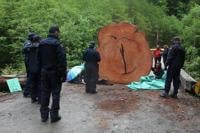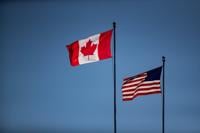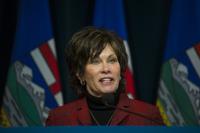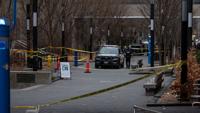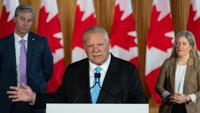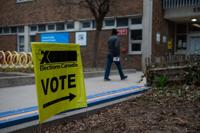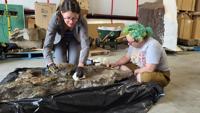The RCMP watchdog has launched a systemic investigation of the British Columbia unit that polices anti-logging and pipeline protests, just as a proposed class-action lawsuit is filed in court over the actions of those officers.
Michelaine Lahaie, chairperson of the Civilian Review and Complaints Commission, said in a statement Thursday that the investigation will look into the activities and operations of the RCMP "E" Division Community-Industry Response Group.
The lawsuit filed Wednesday in B.C. Supreme Court alleges RCMP policies and tactics in enforcing an injunction order at a Vancouver Island old-growth logging protest camp violated the Charter rights of those who had their movements impeded, were arrested, detained or had their property seized.
Court documents say more than 1,000 people have been arrested in relation to enforcing the injunction order at the site called Fairy Creek, and approximately 425 have been prosecuted, primarily on criminal contempt charges.
The statement of claim says RCMP officers made pre-emptive arrests without due process, and assaulted, pushed, dragged and forcefully detained people.
The statement says protesters have been subject to arbitrary searches, their belongings were destroyed, and police have been "herding" people into exclusion zones, while blocking access to forest service roads, preventing medical treatment, and using pepper spray indiscriminately on bystanders.
Halla Ahmed, a lawyer working with the protesters, said they allege the police use of an exclusion zone and tactics like mass arrests and detentions, unjustifiably infringed on the public's rights to protest, freedom of the press, and the right not to be arbitrarily detained or subjected to an unreasonable search and seizure.
Ahmed said getting the lawsuit certified by the court could take at least a year or more.
She said the RCMP's actions had a particularly chilling effect on the media and that the two lead plaintiffs in the case — Arvin Dang and Kristy Morgan — were both trying to document what was happening.
"They were completely blocked access to witnessing arrests and detentions, from witnessing extractions of individuals from Fairy Creek," she said.
"They were made to trek kilometres through the forest without vehicles and they had some of their materials and their equipment seized by the police and not returned."
In a statement, Staff Sgt. Kris Clark, a B.C. RCMP spokesperson, said it would be inappropriate to comment on the lawsuit as the matter is before the court.
The allegations have not been proven in court.
This is not the first time police behaviour at protest sites has been subject to legal challenges.
Last September, a B.C. Supreme Court justice refused to extend the Fairy Creek injunction, saying police enforcement at the site led to serious infringements of civil liberties including freedom of the press. That decision was overturned on appeal.
The United Nations Committee to End all forms of Racial Discrimination has raised concerns about police treatment of protesters at the Coastal GasLink pipeline and Trans Mountain protests.
´şÉ«Ö±˛Ą photojournalist Amber Bracken and news organization the Narwhal have filed a lawsuit against the RCMP, claiming Bracken was wrongfully arrested and detained for three nights while reporting on the pipeline dispute over the Coastal GasLink pipeline. That case has yet to be heard in court.
The RCMP's Community-Industry Response Group was formed in 2017 to provide a co-ordinated response to public order events related to large-scale, resource-based industrial projects in British Columbia.
The complaints commission terms of reference say its review will focus on police enforcement of injunctions obtained by Coastal GasLink Ltd. and two forest companies against protests in B.C.'s Kootenay region, on Vancouver Island and on Wet'suwet'en traditional territory where the natural gas pipeline is being built.
"It should be noted that the systemic investigation will not investigate individual complaints or make determinations with respect to individual member conduct," the document says.
"In cases where member conduct is of serious concern, the matter will be forwarded to the Chairperson for consideration of further action."
The commission said in a statement that it plans to assess if the group's procedures followed the law, its own policies, police training and if those are consistent with the Charter of Rights and Freedoms.
The other factors the commission says it will be considering are if the unit's operations and actions reflect the federal and B.C. government's implementation of the United Nations Declaration on the Rights of Indigenous Peoples and the calls for justice from the ´şÉ«Ö±˛Ą Inquiry into Missing and Murdered Indigenous Women and Girls.
Clark said the RCMP welcomes the investigation and has been working to ensure the office has "comprehensive access and a fulsome understanding" of policies, procedures, practices, guidelines, training and deployments of the response group.
Ahmed said the probe is "encouraging," but adds that it doesn't change the importance of the class-action lawsuit.
"A big part of what we're seeking is that declaration that the RCMP's action over 2021 and 2022 was unconstitutional, breached the Charter rights of these members of the public, and were unlawful," she said.
The lawsuit is seeking damages, though no amount has been set.
Ahmed said accountability from the RCMP would also mean changing its policies and tactics.
— With files from Jim Bronskill in Ottawa
This report by ´şÉ«Ö±˛Ąwas first published March 9, 2023.


